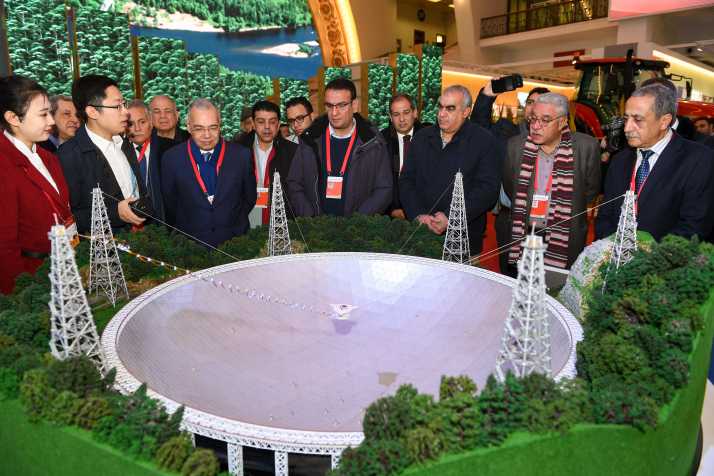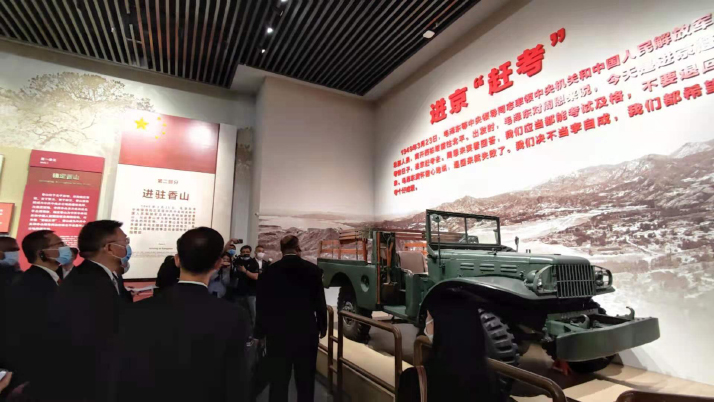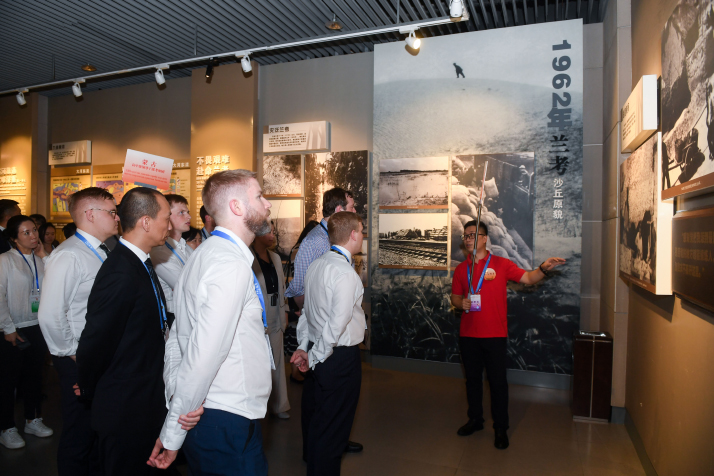| World |
| CPC's aspiring vision of a community with a shared future and how it will get there | |
|
|
 Foreign delegates attending the Communist Party of China in Dialogue With World Political Parties High-Level Meeting visit an exhibition in Beijing on December 1, 2017 (XINHUA)
In 1936, U.S. journalist Edgar Snow made his first visit to Yan'an, Shaanxi Province, home to the headquarters of the Central Committee of the Communist Party of China (CPC) during the late 1930s and early 1940s. At that time, China faced a severe crisis from Japanese aggression while the corrupt Kuomintang regime refused to form a united front of resistance with the CPC. The CPC-led Red Army had just settled down in north Shaanxi after an epic military trek called the Long March to break the siege of the Kuomintang forces and fight the Japanese aggressors. However, when Snow arrived in Yan'an, he was amazed to find that local residents were leading a peaceful and vibrant life. During his four-month stay, he interviewed dozens of CPC leaders. Some interviews were conducted inside local cave-dwellings; some discussions ran late into the night. It was through Snow's reports that the Western world came to know the real CPC and its call to resist Japanese aggression. With common ground built and support flooding in, the rest is history. Proactive international engagement More than 80 years have passed since Snow's visit. The CPC's passion for embracing the world continues, and has become more ardent. The Party has evolved from a few dozen members at its founding into what it is right now, the 91-million-strong ruling party of a country with the world's second largest economy. With the vision of building a community with a shared future for humanity, China is offering Chinese wisdom and solutions to world problems, and the CPC is becoming proactive in international engagement. In the run-up to the July 1 celebrations of the 100th anniversary of the CPC's founding, China and Turkey launched an exchange mechanism for their ruling parties to swap experiences in governance. Seminars were also held between the CPC and political parties from other countries such as Austria, Egypt and Pacific island countries. "It would be hard to understand the miracle of China's development, if one does not know about how the CPC works," Jin Xin, head of the Research Office of the International Department of the CPC Central Committee (IDCPC), said on the sidelines of a recent forum on the Party's external work. Political parties should be the source and facilitators of a nation's domestic and diplomatic policies, as well as work in the interests of the people. By and large, whether political parties function effectively or not can impact the international landscape. The CPC in Dialogue With World Political Parties High-Level Meeting in 2017 drew the participation of representatives of nearly 300 political parties and organizations from more than 120 countries. The event signaled that the CPC is reaching out globally with pride and confidence, explaining the importance of Party leadership and Party building in national development. When addressing the meeting, President Xi Jinping, also General Secretary of the CPC Central Committee, called on world political parties to rise to challenges through global collaboration and create favorable conditions for building a community with a shared future for humanity. Xi said the parties should work together to build a world of universal security and common prosperity. Xi proposed a new model of party-to-party relations, in which political parties seek common ground while shelving differences, and respect and learn from one another. He said political parties of different nations should work together toward an international network of cooperation and exchange in various forms and at multiple levels. The CPC shared its development model with other political parties and learned from the latter's experiences and practices. China advocates that each country should follow its own development path. Xi stressed that China's development benefits every country and that China will not "export" its political system.  A delegation of diplomats from Pacific island countries visits the Fragrant Hills Revolutionary Memorial Hall in Beijing on May 28 (MA XIAOWEN)
Offering Chinese wisdom The IDCPC was established in 1951. Since then, the agency has, in line with China's overall diplomatic strategy, actively promoted the Party's exchanges with other political parties across the world. Today, the CPC maintains close ties with over 600 political parties and political organizations from more than 160 countries, according to Song Tao, Minister of the IDCPC. The department serves to facilitate China's diplomatic agenda, introduce China's governance philosophy to the international community, prepare for major initiatives and activities at home, and promote China's major-country diplomacy, according to Song. "The CPC has many old friends in different countries, many of whom started to engage with China and the CPC when they were young and became important bridges linking their countries with China," Song said in an interview with People's Daily. Friendship was cultivated after years of mutual and multilateral exchanges. The IDCPC has been dispatching delegations abroad to brief foreign political parties about the CPC and update them about the CPC's current undertakings. In the past few years, the IDCPC has also hosted several exchange activities themed on the stories of the CPC, incorporating efforts from provincial CPC committees to showcase the CPC's achievements in governing China to foreign ambassadors and visiting foreign political party leaders. Each of the events focused on a specific area of economic or social development. For example, poverty alleviation was assigned to Yunnan, a mountainous province in the less developed southwestern part of China. Jiangsu, one of China's most prosperous provinces, introduced its approaches in advancing innovation-driven development. During these activities, seminars and on-site tours were held. Local officials were invited to share their experiences with foreign ambassadors and political party leaders during discussions and field studies. According to Jin, most foreign political parties are eager to learn from the CPC's successful experience in boosting economic development and maintaining social stability, especially its strength in mobilizing and ability to keep up with the times, as well as its role in the country's poverty alleviation campaign. Some political party delegations even presented a list of what they wanted to learn prior to their China visits. "In the past, other developing countries in Asia, Africa, and Latin America hoped for assistance from China; now they would like to learn more about how the CPC is governing the country," Jin said.  Representatives of foreign political parties visit an exhibition on economic development and poverty reduction in Lankao County, Henan Province, on June 28, 2019 (XINHUA)
Pragmatic cooperation The CPC's external work has contributed to enhancing the political trust between China and other countries that is essential for government-launched initiatives. The CPC is expanding exchanges with Pakistani political parties to strengthen the ties between both countries and promote the development of China-Pakistan Economic Corridor, a flagship program of the Belt and Road Initiative. Exchange platforms were also established between the CPC and political parties in Southeast and West Asian countries, promoting the successful implementation of mutually beneficial projects under the initiative. Inter-party communication also plays a significant role in fighting the COVID-19 pandemic, reviving the ravaged global economy, and securing supply chains. For example, China donated 800,000 doses of COVID-19 vaccines to Nepal in March. As Nepal was hit by a second wave of infections in May, China donated an additional 100 oxygen concentrators and 600,000 N95 masks to the country through inter-party channels. Oxygen cylinders and other medical equipment are also being sent to Nepal. As the pandemic forces everything online, the Pacific Island Countries-China Political Leadership Dialogue took place via video link in May. Foreign participants hailed the CPC's role in China's progress and development, vowing to enhance inter-party mutual learning and exchanges. They also applauded the Belt and Road Initiative and expressed support for building a community with a shared future for China and Pacific island countries. Both sides called for solidarity over division, openness over isolation and cooperation over confrontation in a bid to jointly tackle global problems, including climate change, the pandemic, and economic recovery afterward. (Print Edition Title: The Party and the World) __________ Numbers As the world's largest Marxist party with more than 91 million members, which has been in power for more than 70 years in the largest socialist country today, the CPC has established different forms of relations with more than 600 political parties and political organizations in more than 160 countries and regions. (Source: www.idcpc.org.cn, compiled by Beijing Review) Timeline 1921-1949 External contacts of the Communist Party of China (CPC) emerged and grew with time, laying a solid foundation for the People's Republic of China's development and its diplomacy and foreign affairs work. 1949-1978 The mission of the CPC's external work was to break the isolation, containment and threats from hostile Western powers, to maintain national independence, sovereignty and security, and to endeavor to build a peaceful international atmosphere conducive to socialist construction at home. 1978-2012 The CPC promoted exchanges with political parties worldwide to cultivate good relations with neighboring countries and create sound cooperation, security and public opinion environment for reform and opening up. 2012- China's international status and impact have reached new heights since the 18th CPC National Congress. China is ever closer to the world's center stage, making even greater contributions in advancing the development of humanity. (Source: www.qstheory.cn, compiled by Beijing Review) Copyedited by Ryan Perkins Comments to maxiaowen@bjreview.com |
|
||||||||||||||||||||||||||||||
|